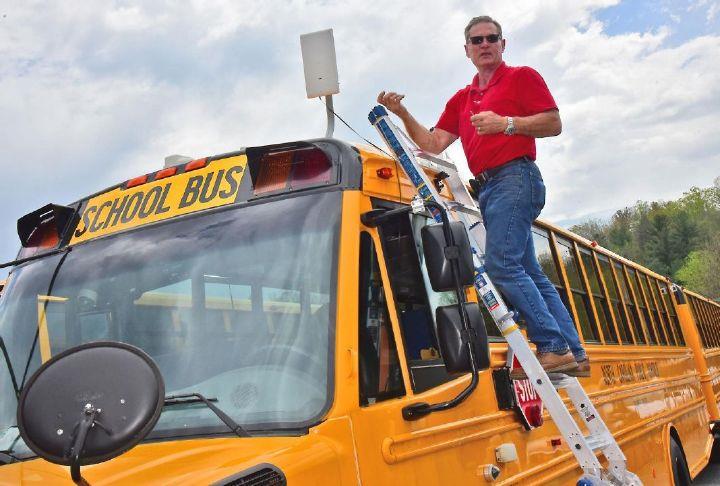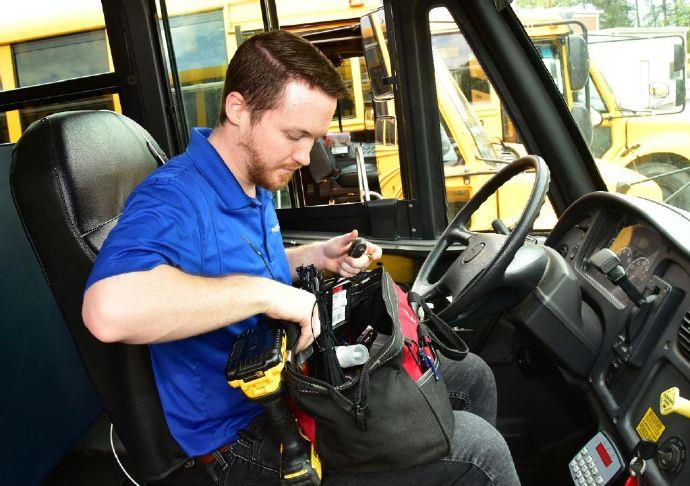With classes now being held via Zoom and other online platforms, students who don’t have internet access at home have been largely cut off from regular daily interactions with teachers and classmates.
But a new partnership in Caldwell County is taking the internet on the road, and school officials hope it will help bring these students and mostly rural communities back into the fold in a world made virtual because of COVID-19.
Thanks to technology from Google and support from the Education Foundation Inc. of Caldwell County, more than 30 Caldwell County school buses have been retrofitted to become rolling hotspots for internet access. These buses are now being deployed in rural areas around the county.
Ben Willis, director of the Education Foundation, said that with Gov. Roy Cooper’s decision to close schools for the rest of the year, the rollout couldn’t have come at a better time.
Each bus is equipped with a cellular hotspot that creates an internet signal that can then be amplified into the immediate surrounding area, said Scott Adams of Aerolina, the Charleston-based internet company that completed the bus upgrades.
The hotspot technology previously had been used in the Rolling Study Halls program to give kids with long bus rides internet access during their commute, but Adams said that when the COVID-19 crisis hit and schools were closed, Google contacted him about doing more.
“Google asked, ‘Can’t we just take those buses, park them somewhere and power them up and allow people to come park and sit around the buses and use the internet?’ ” he said. “So we mounted antennas on the roofs of the buses that put out a Wi-Fi signal that covers 200-300 feet around the bus.”
The buses first went out into the community Thursday and Friday, and Willis said project leaders are focused on finding the most effective sites for them to park. Adams said that the buses can use empty lots at churches, community centers or other open spaces where students can be spaced apart from one another but still close enough to get the hotspot signal.
The process isn’t perfect, Adams, said, because the internet speed will still be reliant on the strength of the cellphone service in the area, but it provides a place for internet access for students who otherwise would not have internet access at all.
Currently, public schools are operating through a combination of online lessons and take-home assignment packets, and teachers around the county have learned that many of their students don’t have either access to the internet or the right technology at home for online learning. At West Caldwell High School alone, teachers prepare and print over 140 assignment packets a week.
Randy Church, chairman of the Caldwell County Board of Commissioners, said that the new rolling hotspots will fill a need among rural residents that has been made even worse by the COVID-19 crisis.
“Social distancing guidelines have brought to light a persistent quandary for many rural communities: When schools pivot to an online experience, what are areas without broadband to do?” he said.
The buses will also serve as a resource for students enrolled at Caldwell Community College and Technical Institute, approximately 38% of whom are high school students taking classes at the college, college President Dr. Mark Poarch said.
The buses will be tracked and their positions will be posted live on the Caldwell County Schools’ website.
Willis said that he recognizes the irony of asking families to go online to find out where they can go for internet access, but as the program continues and bus locations become more stable, families will be able to expect them in certain locations on a regular basis.
Garrett Stell
Reporter
Lenoir News-Topic
Office: 828-610-8723
Email: gstell@newstopicnews.com



